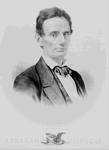Posted on August 31,
2017
No Gray Area
If Rebs were
evil, isn’t America good?
by
Daniel
Clark
As the ironically-challenged “anti-fascism” (or “Antifa”) movement continues to attack Confederate statues and
other symbols around the nation, people on both sides of the political
mainstream have criticized them for their attempted Soviet-style airbrushing of
history. These monuments are historical
artifacts, the argument goes, and we will never learn from certain aspects of
history if the visual representation of them is not even tolerated.
Still, that’s the only case to be made against their
removal, and a pretty weak one at that, considering that these statues’
presence hasn’t stopped the people’s understanding of history from decaying to
the point that it already has. Last
fall, outspoken Wisconsin-Oshkosh professor Duke Pesta
claimed that, according to a history quiz he regularly administers, about 90
percent of his students are “convinced that slavery is a uniquely American
invention.” In fact, this must be what
Colin Kaepernick believes, if his Fourth of July
tweet from Ghana (“a day that intentionally robbed our ancestors”) is to be
taken at face value.
 It
remains a popular opinion, even among respected academics across the political
spectrum, that the Civil War was not about slavery, but instead was fought over
protectionist tariffs or ethereal philosophical differences. This, despite the fact that five Southern
states published declarations of secession, in which they explained that their
break from the Union was unambiguously about slavery. Moreover, almost every major event in early
to mid-19th Century America was primarily about slavery, including
the 1808 ban on the importation of slaves, the Missouri Compromise, opposition
to the Mexican War, the Compromise of 1850, the Kansas-Nebraska Act, Amistad and Dred Scott, the publication of Uncle
Tom’s Cabin, the Lincoln-Douglas debates, the rise of the Republicans and
the fall of the Whigs. But the Civil
War? Nah.
It
remains a popular opinion, even among respected academics across the political
spectrum, that the Civil War was not about slavery, but instead was fought over
protectionist tariffs or ethereal philosophical differences. This, despite the fact that five Southern
states published declarations of secession, in which they explained that their
break from the Union was unambiguously about slavery. Moreover, almost every major event in early
to mid-19th Century America was primarily about slavery, including
the 1808 ban on the importation of slaves, the Missouri Compromise, opposition
to the Mexican War, the Compromise of 1850, the Kansas-Nebraska Act, Amistad and Dred Scott, the publication of Uncle
Tom’s Cabin, the Lincoln-Douglas debates, the rise of the Republicans and
the fall of the Whigs. But the Civil
War? Nah.
If anyone could demonstrate that the presence of
Confederate statues made people aware that slavery was a preexisting condition
that America struggled for almost a century to eradicate, and that the Civil
War was the last stand by that faction of the country that had prevented its
abolition, then by all means, we should put one in every town square in
America. To the contrary, the deference
that is shown to Confederate icons blurs the distinction between the two sides,
and instead treats enemies of the United States as if they were merely an
alternative American military force.
The Antifa demonstrators, on
the other hand, do recognize the Confederacy as an evil entity, but they, too,
fail to distinguish between it and the heroic forces that defeated it, known as
the United States of America. Less than
a week after clashing with neo-Nazis over the Robert E. Lee statue at the
University of Virginia, they staged another rally in Berkeley, California,
where they were recorded chanting, “No Trump, no wall, no USA at all!”
Are those our only two options, to expunge the record
of evildoers, or else condemn a nation that’s been an unparalleled force for
good in the world since its inception?
Surely, it’s not that difficult to draw a moral distinction between two sides
that were diametrically opposed over one of the greatest moral conflicts in
history.
 If
America is to be judged over slavery, then the fact that its founders planted
language to undermine the practice in both the Declaration of Independence and
the Constitution has got to count for something. The anti-slavery majority’s consistent,
incremental, decades-long legislative advance, beginning with the Northwestern
Ordinance of 1787 and culminating in the postwar constitutional amendments, has
got to count for something. The
incomprehensible scale of lives lost, limbs severed and blood spilled at
Shiloh, Antietam, Gettysburg, and dozens of less famous battlefields across the
country has got to count for something.
If
America is to be judged over slavery, then the fact that its founders planted
language to undermine the practice in both the Declaration of Independence and
the Constitution has got to count for something. The anti-slavery majority’s consistent,
incremental, decades-long legislative advance, beginning with the Northwestern
Ordinance of 1787 and culminating in the postwar constitutional amendments, has
got to count for something. The
incomprehensible scale of lives lost, limbs severed and blood spilled at
Shiloh, Antietam, Gettysburg, and dozens of less famous battlefields across the
country has got to count for something.
This America that rooted out and expelled the
tyrannical element within itself is the same America that stood up to one of
the greatest evils the world has ever seen, ultimately freeing countless
millions of people from Soviet oppression.
It’s the same America that, rather than plunder its vanquished enemies,
expends its own resources to rebuild them.
Given a period of time when it was the world’s lone atomic power, the
USA never used that upperhand to its selfish advantage, as any other nation
would likely have done.
It would be nice if controversies like the one in
Virginia encouraged people to discuss the value of human freedom, and America’s
role in shaping the world’s perception of it.
But seriously, what are observers expected to learn from
decontextualized images of Confederate officers? That they wore nice hats?
The Shinbone: The
Frontier of the Free Press